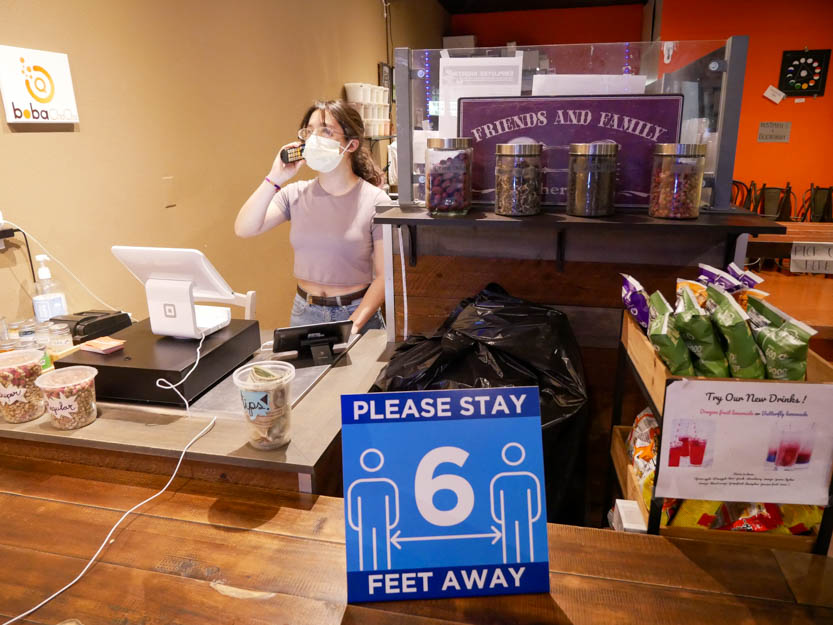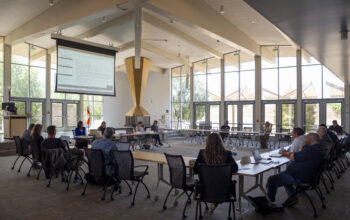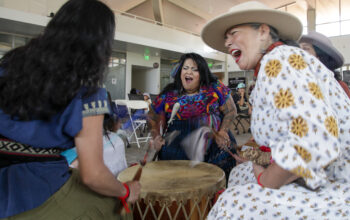Juggling work and academia is nothing new for Pierce College students, but the toll of a global pandemic has caused the increased need for students to find immediate employment.
Kinesiology major Frida Ortuno’s father is at high-risk for contracting COVID-19 and was forced to stop working for Uber because of a previous liver transplant.
Ortuno was able to get a job at a local boba shop where she works about 15 hours a week to help her family pay for bills and groceries.
Ortuno said that working part time and attending school is a difficult challenge.
“My schedule at work is constantly changing, and because of that, I have to keep my studying in check,” Ortuno said. “I try to take care of everything, but I will admit that there is more of a struggle to keep myself on track.”
Ortuno said that the stress of working and attending school during the pandemic compelled her to take fewer classes to make her coursework easier to manage.
“I have to really take care of deadlines and when I have work, it’s already proven itself a challenge,” Ortuno said.
Ortuno said she misses the engagement and motivation that came with being inside a classroom with teachers and students.
Child development major Fuchsia Ullah has also taken a job to help her family while her father works hard to maintain his small business.
Ullah said she has to pitch in with her job at Chick-fil-a where she typically works 40-45 hours a week. Ullah now takes 13 units at Pierce to make her work schedule feasible.
Ullah said she thinks the pandemic has taken away the enjoyment and curiosity that comes with learning.
“Working more has affected my school work. I have a “get it done” attitude and I take less learning experience out of the labs and assignments. There is a lot more stress and anxiety around school work without having the time to attend Zoom meetings.” Ullah said. “I have to come home and learn the material and submit it by the due date. I will find myself finishing up assignments during my breaks to catch up and have free time at home.”
Ullah said that working long hours and the impending deadlines has caused her to struggle to maintain the grades she earned before the pandemic.
“The pandemic has resulted in me feeling very emotionally unstable which sometimes reflects in my academics as well,” Ullah said. “My grades aren’t as high as they once were as it’s hard to actively pursue perfect scores when so much is going on around you.”
Ullah said her interest in school has decreased because of the lack of human connection in online classes and her inability to attend Zoom lectures during work.
“I feel like online classes are not as easy to keep up with and learn information from as in-person classes. I can see myself focusing more and investing more time into school once it’s in-person and I can interact with my classmates.” Ullah said. “It’s also not as fun when there isn’t anyone to talk to in my classes or ask for help, which leads to school feeling more lonely than ever.”
Ortuno and Ullah can see their lives returning to normal once the pandemic is over. Until then they will continue to balance their work and school life to help support their families.
Pierce Counseling Department Chair Tara McCarthy said the counseling department works in an increasingly intimate way with their students.Not only are students reaching out to counselors about academic concerns but for health, financial, and housing reasons as well.
“Now, a lot of it is around basic needs, food insecurity, housing insecurity, job insecurity, either their own personal health issues or having to manage other health issues of family members that they live with,”McCarthy said in a zoom interview. “There’s a lot more than just academics that are being discussed now with students.”
McCarthy said students are reaching out to counselors for referrals to services like the Brahma Pantry, financial aid, technology scholarships, and the CARES Act emergency fund.
Many students are having to make serious decisions surrounding their academic life, according to McCarthy.
“A lot more students are considering the option of dropping classes or taking fewer classes,” McCarthy said.
McCarthy said some students had to make tough decisions on delaying or completing their goals to be successful.




